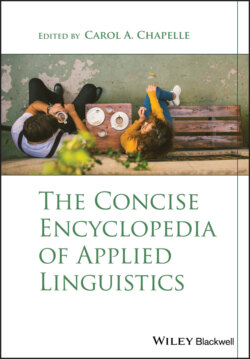Читать книгу The Concise Encyclopedia of Applied Linguistics - Carol A. Chapelle - Страница 24
Classification
ОглавлениеAdverbs are usually categorized according to their position and function within the clause. More than any other word class, they demonstrate the interdependency between grammar and meaning, although accounts differ markedly in their classification schemes and terminology. This may lead to terminological confusion (see Hasselgård, 2010, pp. 14–39). Quirk et al. (1985, pp. 438–653) and Crystal (2004, pp. 268–93), in his synopsis thereof, distinguish four classes of adverb divided into two main groups: adjuncts and subjuncts; disjuncts and conjuncts. Adjuncts relate to the verb or “verb phrase” (He ate slowly and surely; he had time, and he had strength) or to the entire clause (Nowadays, there is no excuse for getting into trouble). They constitute the largest subgroup of adverbs, and include such traditional categories as adverbs of place, manner, and time, sometimes known collectively as “circumstantial adverbs” (Biber et al., 1999). Occasionally, adjuncts may be obligatory—they are required by the verb to make the clause grammatically acceptable and usually occur at E: Ruth lives in Berlin; We wanted a relaxing, fun day and thankfully everything went wonderfully; The dinosaur exhibition extended through the summer (see Goldberg & Ackerman, 2001; Hasselgård, 2010, pp. 46–8, 124).
Subjuncts generally play a more subordinate role in relation either to the clause or to a clause element, especially the verb or verb phrase, here to heightening effect: We couldn't, literally couldn't, have managed without your help. Subjuncts comprise adverbs expressing: viewpoint (Economically and politically [speaking], they've been completely disenfranchised); focus (Only the lonely know the way I feel tonight); degree (You simply must let me have a copy); and courtesy, where their role is essentially formulaic (Please mind the gap / Kindly allow me to speak). In short, subjuncts add the speaker's slant toward the content of the associated clause (Crystal, 2004, pp. 284–5). Disjuncts have a superior role in relation to the clause, by making a judgment, a comment, or an evaluation about what is being said: It is arguably the most important discovery; Fortunately, or unfortunately, that is easy work now; Consequently, it is regrettably inevitable that personal property will occasionally go missing. Conjuncts are peripheral to clause structure and have a linking or relational function between clauses when these are viewed as connected discourse: It happened before dawn so they might have been asleep at the time; Environment can never completely explain art. I am sure, however, that it plays an important role; We have a way of talking, and thus a way of thinking. In combination with modal verbs, certain types of subjunct and disjunct are significant for the expression of modality: In this context it may well be true; This is one wheel that you definitely should not try to reinvent; Perhaps they might even learn to think critically instead of parroting; Of course, there may be special occasions where an exception should be made. (See further Hoye, 1997; see also Simon‐Vandenbergen & Aijmer, 2007, pp. 68–9, and Aijmer, 2009, on the issue of modal adverbs and modal particles.)
